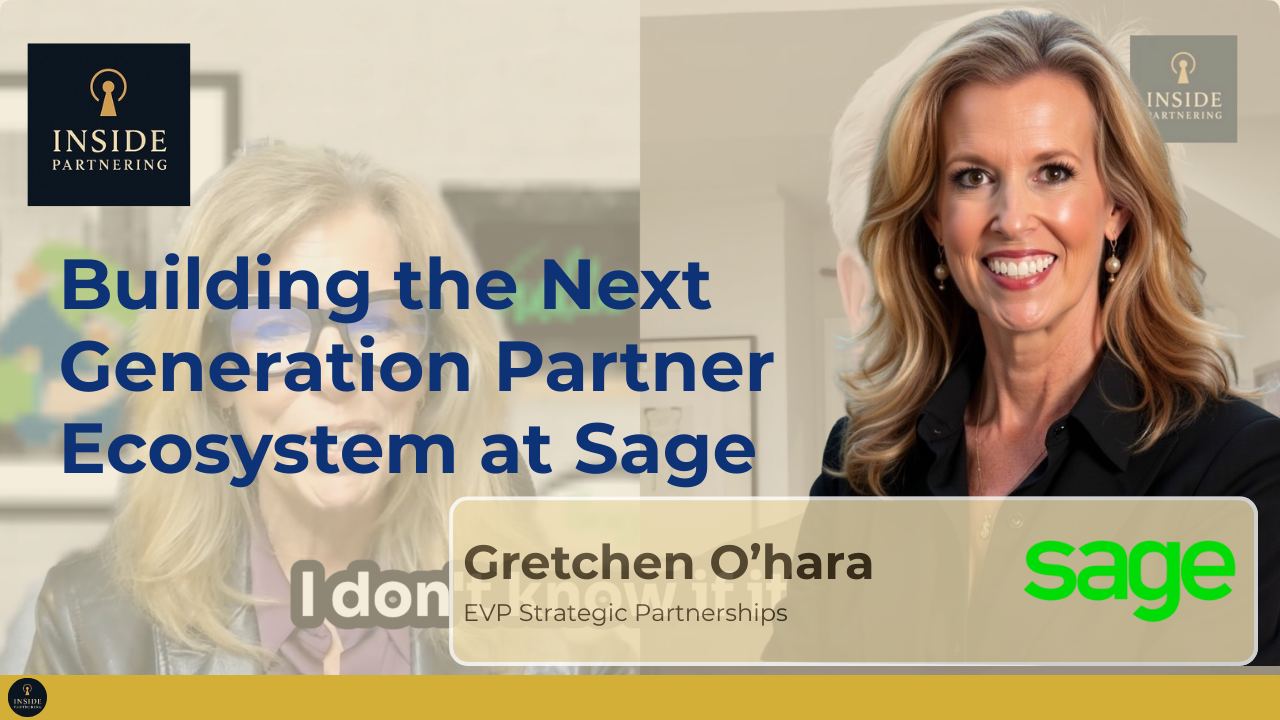Episode Overview
“If you want to go far, go with a partner.”
That sentiment couldn’t be more true for Irina Kurdanowa, Global Senior Director of Partnerships at Spryker Systems—and it shows in how she’s built one of the most partnership-driven organizations I’ve seen.
I had the pleasure of catching up with Irina at Catalyst 2023 in Denver, where she shared Spryker’s remarkable journey from a German startup to a partner-first global force in composable commerce.
When Irina took over the partnerships team, there was no PRM, no formal program, and partners contributed little to revenue. Fast forward four years—and 98% of Spryker’s net-new revenue now comes through partners. That’s a transformation worth spotlighting.
Here are a few powerful takeaways from our conversation:
- Three core partner KPIs: sourced revenue, influenced revenue, and delivery success
- Tight sales & partner alignment: one global target, no internal competition
- Scalability through trust: leveraging local partners to enter new markets
- Efficiency at scale: partner-sourced deals lower CAC and quadruple win rates
Irina’s team doesn’t just build partnerships—they operationalize them with rigor and data. From enablement to measurement, partner success is tracked across the entire lifecycle, with delivery outcomes as important as deal sourcing.
She also emphasized culture: there’s no turf war between direct sellers and partner managers at Spryker. They’ve aligned incentives and built unified deal teams focused solely on winning for the customer.
And what’s most exciting? This wasn’t a top-down mandate. Irina built it all from the ground up—with vision, hustle, and a passion for collaboration.
Thank you, Irina, for sharing your incredible story and setting the bar for what a modern partner-led GTM looks like.
🎧 Watch the full interview on the Inside Partnerships podcast.
Podcast
Guest

Irina Kurdanowa
Senior Global Director Solution Partner
Episode Transcript
Chip Rodgers 0:00
Team. Hey everyone, welcome back. I'm Chip Rodgers, Chief partner Officer at workspan, and we're here afternoon of Tuesday afternoon on the expo floor. And just it's been a ton of great sessions, a lot of good keynotes. And Dave, you heard anything that was interesting for you? Anything that was like, Keynote source, or the, have you gone to some of the, the the lightning talk, kinds of things, or
Irina Kurdanowa 0:28
it was very, very interesting. It's a top notch event. I didn't expect it. It's the first time for me. But everything like I heard, it's like, truly adding value to the world of partnerships. We're engaging, like, regarding a lot of problems, and everyone seems to struggle with the same thing. Some of them are a little bit more far, like, advanced in terms of solutions, and they're learning from each other. So I absolutely love it. And if I would recommend anyone to join like this, any event within the next year, catalyst is going to be the thing, like, from in my network, everyone will hear about it, because I believe this is the next event for partner leaders, but also partner leaders who want to become, like, step up in management, or become better in their job, to be here,
Chip Rodgers 1:15
yeah, yeah, that's that's really true. It's been fantastic. I mean, 700 people, and it's just grown so much from last year, so much bigger, and such great content for you know, really professional development. And how do we, how do you become a chief partner officer, right? Yeah. So I am so excited. We here. We are talking. I am so excited to be joined by by Irina Coronavirus, and Irina is with spryker, and she's global Senior Director of solution partners, basically the system integrator partners for for spriker. Irina and I met in with Asher in Berlin when we were on our European tour, and we convinced you to come over and come to come to catalyst. So, Irina, welcome.
Irina Kurdanowa 2:03
Thanks for having me. Yeah.
Chip Rodgers 2:06
So love to talk a little bit about the partner strategy at spriker. And you know, you're focused on the system integrators, but I know spriker has, you know, a lot of different kinds of partners. How does, how do partners fit into the into the the strategy for the go to market strategy for spryker.
Irina Kurdanowa 2:27
Okay, okay, so I joined spriker almost six years ago, and at that time we were, like, pretty small, of course, it was more startup. We were really, really much, based only in Germany, and I was a partner, individual myself, right? So was a contributor. And while doing that, I really, I was my background to sales. I saw, like, my passion for collaboration, working with partners, right? And I easily find my way how to build like a pipeline through the partnerships. And then things started to develop. And coincidentally, I was, I became, I took over the team, right? And at some point we decided to grow internationally. And of course, that was also like requesting from my side, to hire a global team, find global partners, and turn pretty much the company into partner organization. And that was really a challenge, because I remember exactly the time we didn't have much revenue contribution from partners. At that time, we didn't have like a PRM, we didn't have like a real partnership program, and by taking over this team, I felt like accountable to set this all up. So during the last years, four years in total, being a leader of this department, I was able to grow partner source revenue. But we actually, over the years, also established a lot of metrics. Right? So metrics? How do we measure our partners? How is what's great? Exactly, what is success measured on like partner? Source, revenue is just one component, right? So you, when you're building like an ecosystem, you also need to measure the component of influence revenue. So revenue which you're giving directly to you, to your partners, right? How much likeliness Can you win? Right? So that's another KPI which we are currently really strong at, like, who are the partners we need to put in, into the deals, which our direct team is engaging. And then the third component which we are actually working with is, like, the success of the delivery of the project. So we wanna, we have an own enablement team, right? So we developed that over the years. This is teaching, not only winning the customer, but also delivering it successful, right, like delivering the project to success on time in budget, right, and also keeping the customer happy. So these are the three metrics, how we actually measure our partners. We do have another metric, which is, of course, our the. Technology development. That's what we also use our partners for, and that, over the years, made us turn sprika being a partner first organization. And what I can tell, and I'm very proud of this, because it hasn't been that way like years ago, is that 98% of our entire business, if we go for net new revenue is delivered through partners, right? And this was the 98% 98% this was the most important thing for me. So we kind of narrow down our entire services. We focus our services completely on product development, while leveraging also the resources of the partners. But on the other hand, every project, every project, we win new customer existing customers is with a partner, right? Sarah, there is no incentive to add services, only for a little bit of support, but we have no capacity and no interest to become assistant greater or ourselves, which truly provides the value in order to shape the market of composable commerce, but also giving business back, as well as returning from the partners and like entering the market together. So it's a true team play. And I think what's also, what this is also another factor, which I have learned during the last, actually, no, almost two days, is we don't have a competitive positioning between our sales and our partnership team, because at some point we realized, rather than having these two streams separated, we decided to go for one global target and just serve the best for the company. So the partnership team and the sales team are working hand in hand, right in a real deal team in order to accomplish the customer rather than fighting, hey, this is my customer. What? This is the customer, which I was generated by the partner. This is not how you going to be successful when you're scaling up an organization that is entering the market as an underdog.
Chip Rodgers 6:57
That's amazing. So, so great that you've, you know, you've aligned the both the partner the partner teams in the sales team, so that everyone's, you know, there isn't that sort of internal tension.
Irina Kurdanowa 7:08
Yeah, true. It was a very big, big thing, because it hasn't been that way in the beginning. But we saw a lot of challenges, and then we realized our sales teams are the professional when it comes to selling to the customer, building customer engagement, working also with the partner, like with the sales manager or the partner side. How can we win together while the partnership team is managing the overall relationship, building a go to market strategy, building like proper business plans and thinking about new ideas. What can we do extra like, what does it take to win? And if we have something that works really well, let's double down on it.
Chip Rodgers 7:50
It's awesome. So Irina, you know, love to talk. One of the things we thought would be interesting is, I love to hear how spryker and the partner teams, you know, specifically, are showing value to the back to the organization. I think you already talked some of it about, you know, about measurement and and, gosh, if you're delivering that, you know, such a high percentage of revenue, then you know, partners are critical.
Irina Kurdanowa 8:17
So I think a lot of, a lot of the values down to data, right? So what we have encountered over the years, and I backdated, of course, based on the metrics we have in the background, is, for example, how much does it cost to create an opportunity from like, end to end, right? So you're not having partner involved. You have marketing team. Like the marketing team needs at least 10 touches with the customer to create, like, a real, proper MQL, then a BDR is following up, right? Then the sales is following up, then you have a demo team working on it, right? So you have so many multiple components and that all like the time and the resources you need to put on it is money and time, right? So if you compare it with something which you generate through partners who are actually leveraging through partners, of course, the numbers are way lower. So the customer acquisition cost is one big component which has showed that going to partners, working with partners, is, of course, adding a lot of value. I think another factor is, of course, the scalability, right? You will never have such a big sales organization yourself compared if you work with the really well committed partners, right? Because you can leverage their sales power into markets where you maybe have no visibility, right? I was just today talking with with a leader from the Middle East, and he clearly said, like you don't, you will never understand because you're coming from Europe, right, or anywhere else in the world, you will never understand the culture, but your partners do, right? So, entering the market through cultural like understanding with the partner who's local, right? Create. Get trusted amongst the customer is another factor of value. And I think what really, really helped us over the time is the winning probability, right? So my, my biggest learning is, if you enter with the partner into an opportunity, right? Or you get it from a partner, the chances you're gonna win this deal together is, and I'm not making up numbers here, it's four times higher, right? Compare if you would do it alone. There is also a saying, and I don't know, like I was just recently talking about, if you want to go fast, go alone, right? But if you want to go far, you're gonna have a partner behind you. And that's that's truly like what it is about, and that's why partnerships are becoming the key figure right now when it comes to efficiency, right and be successful in the market? Yeah,
Chip Rodgers 10:50
that's fantastic. Irina, thank you so much for sharing some time with us. You know, this afternoon, I really appreciate it, and it's been a great event, and glad you were able to make it over and, and, and, you know, take in all this incredible meeting with a lot of partner folks so, so thank you.
Irina Kurdanowa 11:12
Thank you chip. I'm very happy to be here and I see you next year. Bye, bye. Okay.
Chip Rodgers 11:17
Thanks, Irina, and thank you all for joining and see you next time that was hard.

Chip Rodgers
🚀 CMO | Chief Partner Officer | B2B SaaS Growth & GTM Leader | Ecosystem Strategy | Demand Gen | Podcast Host 🎙


.png)

